Eucalyptus is an effective form of pest control in the form of dried plant materials, essential oils, and planted shrubs/trees. It’s effective against almost a wide majority of insects and pests, and it’s one of the least toxic insecticides that you can use. Eucalyptus oil is natural and it smells nice. It’s easy to use as a spray in closets, around entryways, and on skin.
There are many bugs that are repelled by eucalyptus leaves or eucalyptus oil. Keep reading to learn about 8 of the most pesky invaders that are deterred by eucalyptus.
Mosquitoes
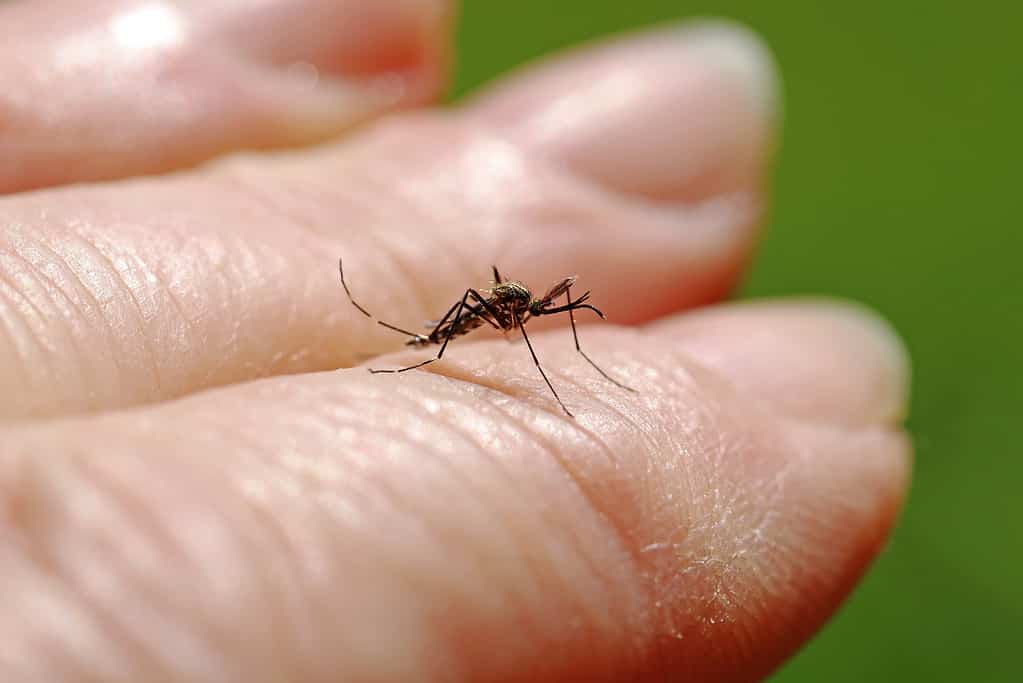
Mosquitoes can spread malaria and other dangerous diseases. You can repel them with eucalyptus oil.
©Astrid860/ via Getty Images
Mosquitoes are an important pest to repel because they can transmit malaria, zika, and many other viruses. Usually, citronella is used for mosquito prevention. However, a recent scientific study has proven the effectiveness of two other essential oils to prevent pests.
Scientists discovered that E. globulus and S. aromaticum essential oils, when mixed at a 1:1 ratio, scored a 95% landing repellency for mosquitoes. E. globulus is a type of eucalyptus also known as blue gum. It has a high content of cineole, a chemical known to deter pests. In the scientific study, the eucalyptus oil was pretty effective at repelling pests alone (around 78% landing repellency). However, it worked best alongside clove oil or S. aromaticum.
This study, which was conducted in 2019-2020 shows some promising results for natural pest prevention. It’s encouraging that natural products like eucalyptus oil can provide pest control without some of the side effects that synthetic chemicals bring. The leading synthetic pest repellent — DEET — is dangerous for the environment and can cause harmful side effects including neurotoxicity.
Eucalyptus is a safe and effective treatment to use for mosquito bite prevention. You’ll first need to dilute it with a carrier oil like olive, coconut, or argan oil. Eucalyptus is most effective at 10% concentration, so mix it with a carrier at a 1:10 ratio. Then, you’ll get clove oil and dilute it with a carrier at 1%, or 1:100. Once the two oils are diluted, mix them together in an equal ratio (1:1), and you’ll have a skin-safe, effective form of pest control. You can put it directly on your skin, apply it to your clothing, or make a pest control bracelet by adding it to some fabric or a scrunchie. Keep in mind that everyone’s skin is different, so test it on a small patch of skin to check for reactions before applying it to a large part of your body.
Spiders
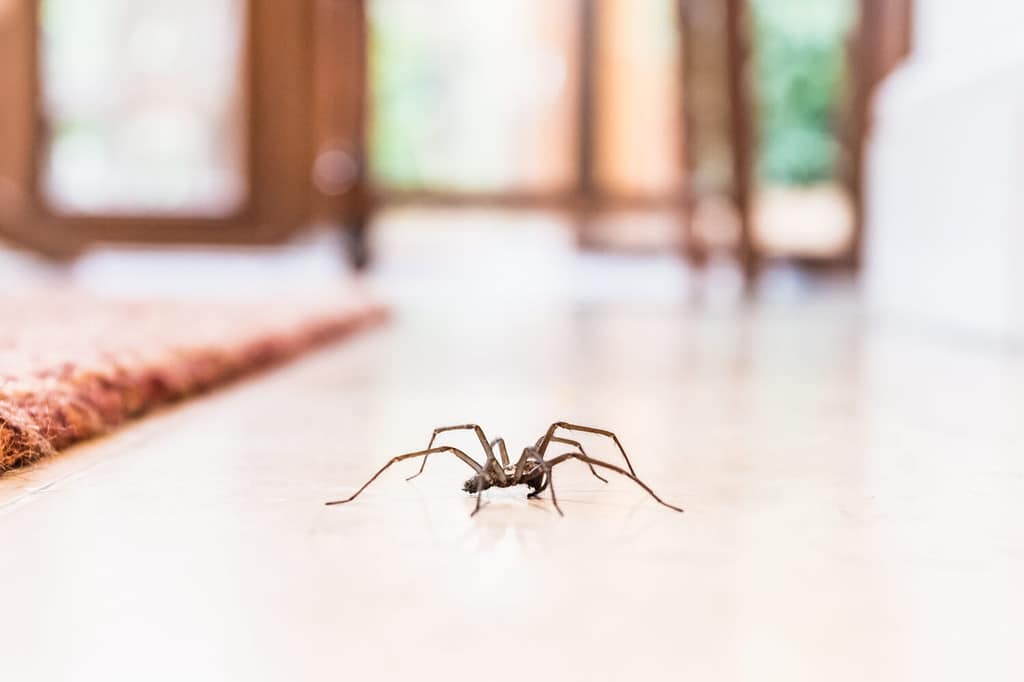
If you want these crawling creatures out of your home, try spraying eucalyptus oil around your entryways.
©Christine Bird/Shutterstock.com
Spiders are fascinating little beings because so many people either love or hate them. Out of the 43,000 species of spiders, only around 30 are venomous, but still, many people are absolutely terrified of them! To be fair, the deadliest spider in the world can kill a human within minutes. However, spiders really only kill around seven people per year, which means you have a higher chance of being killed by a cow or a dog.
Whether you love or hate the little arachnids, you probably don’t want them in your house. That’s where eucalyptus comes in. You can spread eucalyptus oil around the baseboards of your home and in doorways. You can plant eucalyptus in pots, specifically in areas like windowsills or beside entryways. Also, you could burn eucalyptus incense or use eucalyptus oil in a diffuser. Not only can eucalyptus grow in pots, but it grows well in the ground too. When planted, eucalyptus can grow as a tree and reach heights of around 10 feet or more.
Roaches
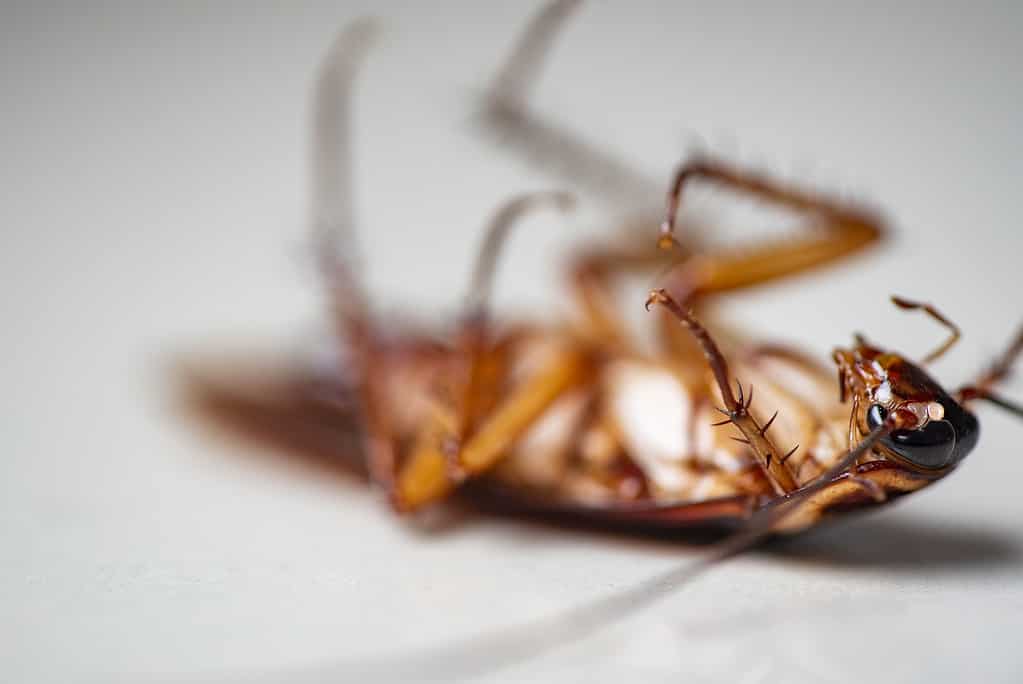
Nobody likes ’em, but they’re still around! Chase roaches off with a mixture of eucalyptus, oregano, and rosemary essential oils.
©iStock.com/panida wijitpanya
I always dread the dog days of summer, those first few weeks of August that just hang around and soak through every piece of clothing you own. That’s because those days bring — along with many other problems — roaches. Now, I can’t blame the little creatures for wanting in on a bit of AC, but I definitely don’t enjoy having them in my house.
Since the amount of roaches I see in my home drastically decreases come autumn, I don’t like using pest control for just a few weeks. For one, the chemicals aren’t safe for children or pets, and for two, it’s a pretty penny for someone to come spray poison around my house. If you’re like me and wondering how you can get rid of these unwanted guests, you’re going to love eucalyptus oil.
As with mosquitos, roaches are most repelled by eucalyptus oil when it is a part of a mixture. In one scientific study, researchers found that the best mixture for repellency and toxicity to roaches was to use eucalyptus, rosemary, and oregano oils together. You can place these oils around entrances and windows, and in any areas where structural cracks are present.
Ants
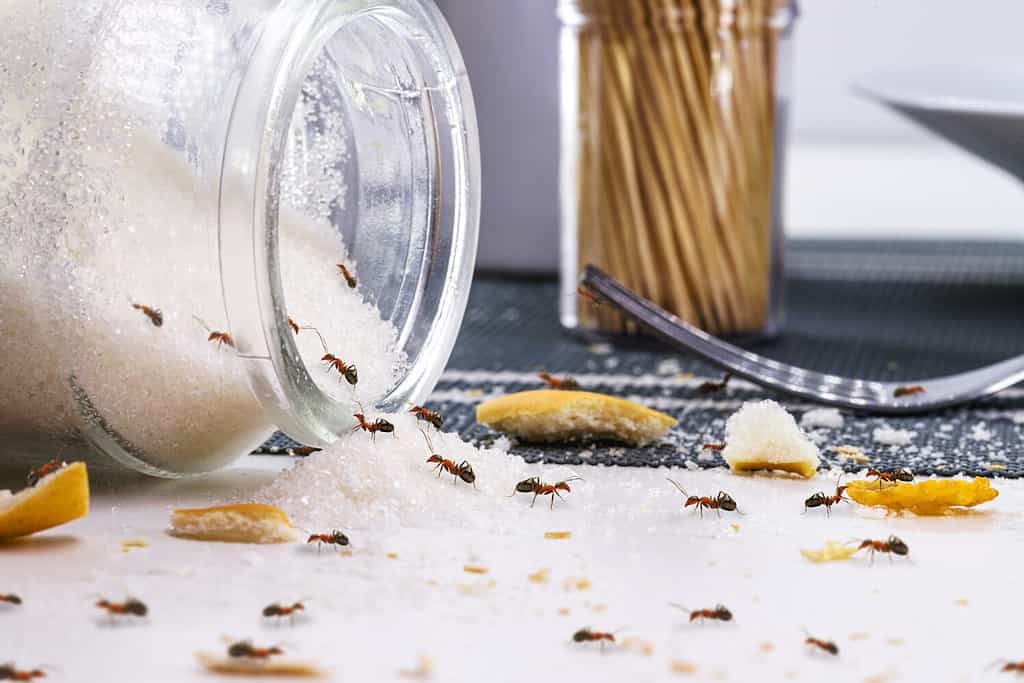
If you’re having an ant problem, try using eucalyptus to block their scent trails.
©RHJPhtotos/Shutterstock.com
A little-known fact about ants is that they have a stronger sense of smell than dogs. In fact, scientists theorize that ants may actually have the best sense of smell of any organism on the planet! In a 2022 study, researchers found that ants could learn to detect cancer cells by scent in just 30 minutes of training. This study was a breakthrough in understanding ants, which are faster, easier, and much less expensive to train than dogs.
Because ants have such strong olfactory receptors, they are really sensitive to smells. That means that strong scents, especially those that are pungent like eucalyptus can be very off-putting for ants. Eucalyptus oil, or E. globulus, from the gum eucalyptus tree, is the best deterrent for ants.
Ants live a lot of their life based on scents. They mark food sources with scents, they leave scent trails to go to and from their nests, and they communicate with scents. So when an essential oil is applied over their scent trails, it causes them to lose the trail. A strong whiff of eucalyptus is too much for their receptors, and it makes them go in the opposite direction.
Aphids
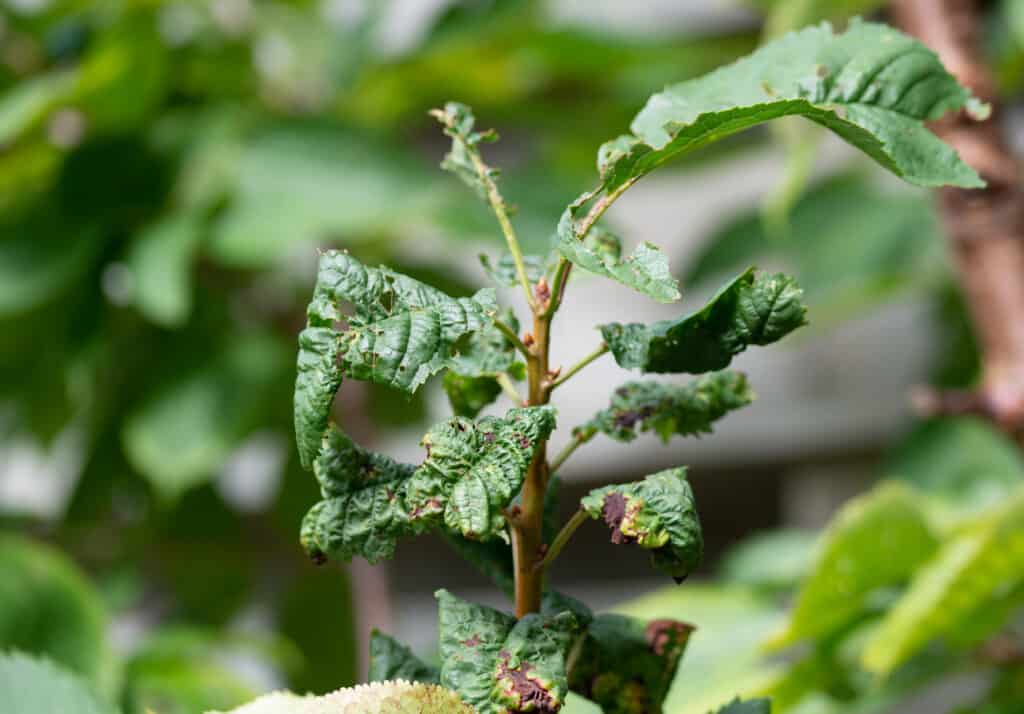
Curled or discolored foliage is a sign that aphids have been in your garden.
©SrideeStudio/Shutterstock.com
Aphids can become a problem quickly for farmers and gardeners. They damage all kinds of plants by sucking the juices out of them. An aphid issue often looks like yellowing, leaf curling, and discoloration on your plants. Some species of aphids even inject poison into leaves along with draining them of their fluids.
It’s hard to use pesticides on aphids because they attach to leaves and trees, which can also be killed by poisons. If aphids are harming your vegetable garden, you definitely don’t want to use pesticides in areas where you’ll be growing foods. Eucalyptus shrubs and oils are a great way to avoid spraying chemicals in your yard. You can plant eucalyptus shrubs or trees around your problem areas and vegetable gardens for a constant form of aphid prevention. If you notice aphids on your plant, you can spray diluted eucalyptus oil on the plant without fear of harming your garden. One study showed that a combination of black pepper oil and eucalyptus oil worked well together to prevent and repel aphids.
Silverfish
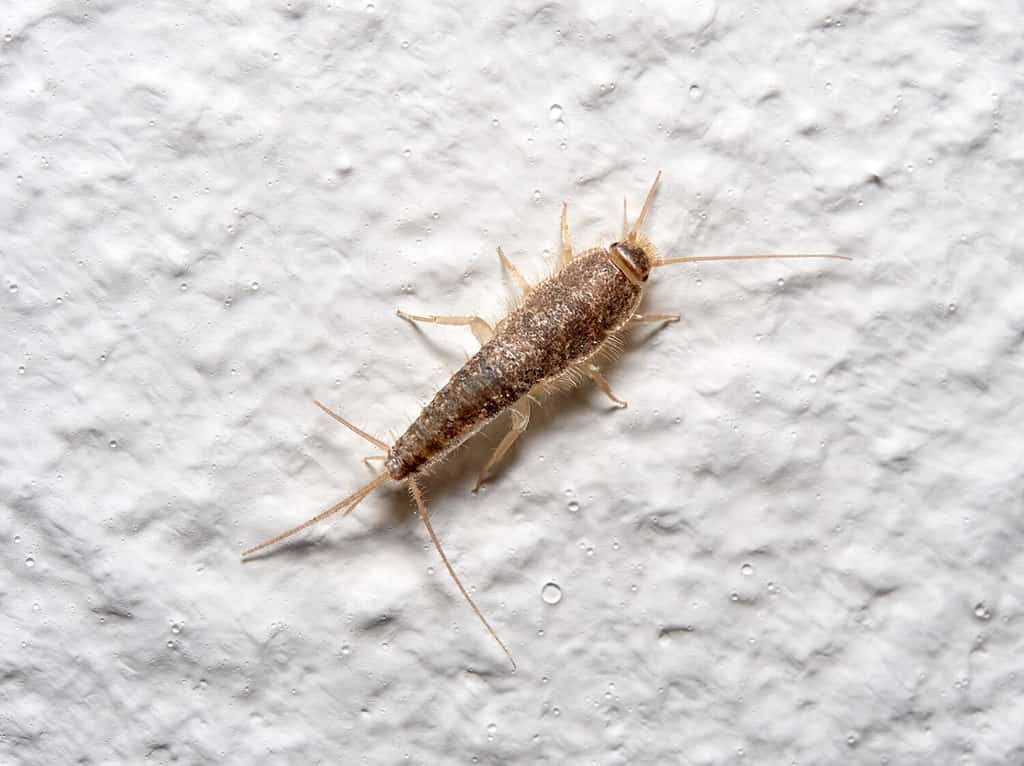
These paper-eating pests are some of the creepiest crawlers.
©Macronatura.es/Shutterstock.com
Though these little bugs may look creepy, they’re not the worst pests you could have. They eat predatory bugs like spiders, they don’t bite humans, and they don’t carry any diseases. As household pests go, silverfish really aren’t too bad. But even though these strange-looking creatures won’t hurt you, you don’t need them living in your house.
Similarly to ants, silverfish are repelled by almost any strong scent. That means that almost any aromatic oil works as a deterrent for silverfish. Since eucalyptus produces such a strong odor, it makes sense as to why silverfish are so affected by its essential oil.
You can apply the eucalyptus essential oil to areas where you see silverfish or diffuse it in rooms that have a lot of paper or fabric. Silverfish mainly consume things like books, clothing, and other fibers. They will even eat other silverfish — living or dead. They generally live in moist, dark places, so be sure to add a few drops of oil under your sinks and in rarely-opened closets.
Moths

Because mothballs are small, white, and round, they can look like food to children and pets. Eucalyptus oil is a great alternative to using poisons like mothballs.
©Bowonpat Sakaew/Shutterstock.com
While mothballs had their place in time, they’re fading as a form of pest prevention as the public realizes their dangers. Mothballs are toxic to humans and animals. Their fumes are full of chemicals and breathing them in can cause headaches, dizziness, nausea, and/or vomiting. If you breathe in a large amount of fumes or swallow a mothball, you can develop hemolytic anemia.
Some people use mothballs outside to repel snakes and other pests. Despite that, it’s illegal to use mothballs outside because they can harm animals, insects, and the environment. Regardless of the many problems and dangers of mothballs, they are still sold and used in the United States.
Essential oils provide a safe alternative to poisons like mothballs. Moths are repelled by many types of essential oils, but eucalyptus is one of the strongest repellents. You can mix the oils with water and spray them in closets. You can also make sachets out of eucalyptus leaves and stems to place in your drawers. Make sure to replace your sachets every few weeks and respray your oils every month or so.
Flies
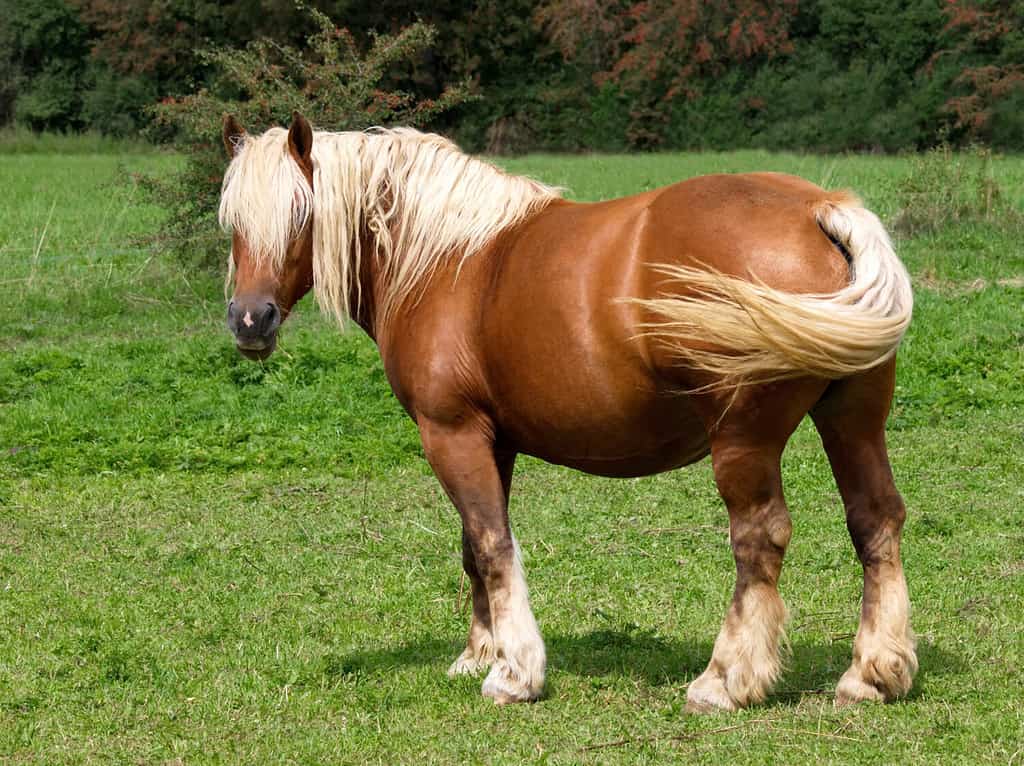
Spray eucalyptus oil on your horses in areas they can’t lick, and plant the shrub around your pastures.
©Grimplet/Shutterstock.com
Flies may not be the grossest insects, but they’re certainly one of the most annoying. They get in your face and then somehow manage to disappear as soon as you can find the swatter. But there aren’t a lot of effective ways to repel flies because they don’t usually live in homes. They sneak inside with any open door or window, and then buzz around bothering everyone after they’re in! You can burn eucalyptus incense in your home and diffuse the essential oil to deter flies from coming in.
If you’re outside, especially amongst livestock like horses or cows, you’ll probably run into a lot more flies. At some point, you may have wondered how to repel some of the flies off of you and your livestock. Luckily, eucalyptus oil is a safe way to get rid of flies. You can dilute it in water and spray it directly on your skin or horses. Keep in mind that eucalyptus oil can cause negative effects if ingested, so try to keep the spray off of areas that might end up in your horses’ mouths.
How To Safely and Effectively Use Eucalyptus to Repel Pests
There are a few things that you’ll want to keep in mind when using eucalyptus as a pest repellent. First of all, if you use eucalyptus essential oil, keep in mind that it’s incredibly potent. Just a small amount goes a long way, and that’s especially important to keep in mind when it comes to skin application. You shouldn’t apply undiluted eucalyptus oil to your skin. It isn’t dangerous, but it can cause skin irritation.
You should never consume eucalyptus essential oil. You should also avoid using the oil on children and pets. It can become dangerous due to the danger of ingestion. If you use the oil around your home, keep it out of areas where it can be reached by pets or young children. Likewise, the leaves of eucalyptus shrubs and trees are poisonous as well. Cineole — the same compound that aids in pest repellence and gives eucalyptus its’ strong scent — is also what makes the leaves toxic. They are generally safe to touch, but should never be ingested, and touching can even cause skin irritation for some people.
As long as you follow a few guidelines for safe use, eucalyptus can be great for repelling pests. It’s effective against pests in different ways, from growing the plant to the essential oil. You can view our chart below to view the most effective way to use eucalyptus.

Koalas are one of the only animals that can consume eucalyptus leaves because their bodies are able to flush out toxins more quickly than they can build up!
©rickyd/Shutterstock.com
8 Pesky Invaders Repelled by Eucalyptus’s Scent
| # | Pest | How To Use Eucalyptus |
|---|---|---|
| 1 | Mosquitoes | Grow plants in pots near doorways, and spread the oil along entryways. |
| 2 | Spiders | Grow plants in pots near doorways; spread the oil along entryways. |
| 3 | Roaches | Mix eucalyptus oil with rosemary and oregano oils and apply to cracks, entrances, and windows. |
| 4 | Ants | Use eucalyptus oil to cover ant trails and any visible cracks. |
| 5 | Aphids | Spray diluted eucalyptus oil on trees and plants, mix with black pepper oil for added effectiveness. |
| 6 | Silverfish | Diffuse eucalyptus oil in rooms with lots of paper and fabric. Put the oil in areas where you see silverfish and in moist, dark places. |
| 7 | Moths | Make sachets from eucalyptus leaves and stems and place them in your drawers; spray a eucalyptus oil and water mixture in your closets. |
| 8 | Flies | Spray the diluted oil on your skin or on horses (be sure to avoid consumption). |
If you’re thinking about adding a eucalyptus shrub or tree to your yard and looking for a reason to do so — here it is! Eucalyptus is great for repelling pests outside and inside, and growing it around your home provides a continual pest control.
The photo featured at the top of this post is © iStock.com/Marina Denisenko
Thank you for reading! Have some feedback for us? Contact the AZ Animals editorial team.







